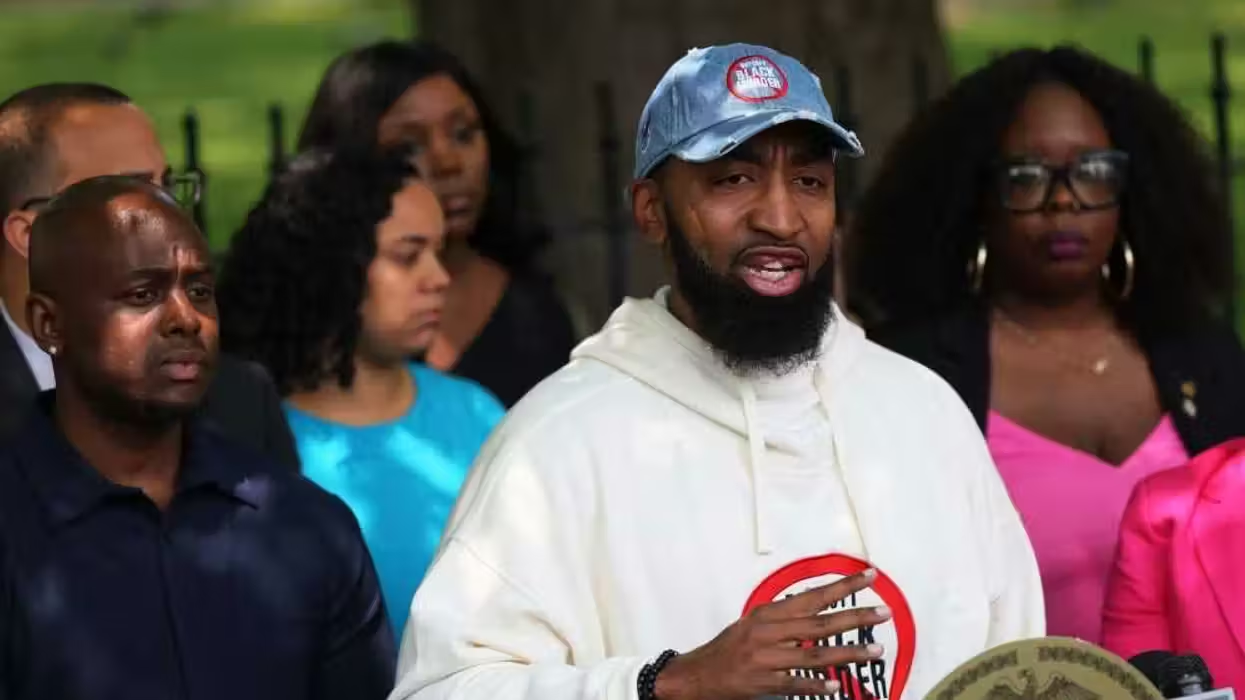With the first "imported" case of Ebola into the U.S. dominating headlines this week, the issue of how to prevent other surprise cases from coming to America has become a hot topic.
Airport screening has been a target to prevent infected patients from traveling, but Dr. Amesh Adalja, an infectious disease physician with the University of Pittsburgh, told TheBlaze focusing on identifying the sick at an airport is like trying to find a "needle in a haystack."
"The airport screening is less important than emphasizing" what happens when they show up for health care, Adalja said of possible patients. More important, he said, is for doctors to take an accurate account of a patient's recent travel history.
"What I really worry about ... is that people will be incubating the virus and then get sick here. The key action is asking the travel history," he said. "That’s where real linchpin of our prevention plan is. That’s what really has to be emphasized to minimize any collateral damage that these imported cases will cause."
 Howard University Hospital has admitted a patient with Ebola-like symptoms according to a hospital spokesperson October 3, 2014 in Washington, DC. The unnamed patient was admitted overnight and recently traveled to Nigeria, presenting symptoms upon his or her return, according to hospital spokesperson Kerry-Ann Hamilton. (Chip Somodevilla/Getty Images)
Howard University Hospital has admitted a patient with Ebola-like symptoms according to a hospital spokesperson October 3, 2014 in Washington, DC. The unnamed patient was admitted overnight and recently traveled to Nigeria, presenting symptoms upon his or her return, according to hospital spokesperson Kerry-Ann Hamilton. (Chip Somodevilla/Getty Images)
It is this detail that fell through among doctors at Texas Health Presbyterian Hospital in Dallas when a man, who was later identified as Thomas Duncan, first showed up. Duncan went to the hospital last week but it was not communicated with all members of the medical staff that he had recently been in Liberia and he was sent home. Duncan was later transported back to the hospital on Sunday in an ambulance. He was the first person to be diagnosed in the U.S. with Ebola and remains at the hospital for treatment. Those who could have come into contact with infectious bodily fluids from Duncan are being monitored by health officials.
Patients too, Adalja said, should not hesitate to seek help if they recently traveled to a country with Ebola and are exhibiting symptoms. The key here is that they should disclose this information when they are calling 911 for an ambulance or making a doctor's appointment, so health workers can take precautions.
"You don't want to make your caregivers sick," he said.
With American doctors having experience in dealing with other infectious diseases, such as MERS, HIV and tuberculosis, Adalja said he doesn't think patients should have a fear of being stigmatized, something with which West African countries are struggling.
As for what is being done in airports to "limit exportation of the disease," Adalja said those in West Africa that are impacted by the historic outbreak are taking the temperatures of travelers and requiring them to complete questionnaires that ask if they have recently come into contact with Ebola patients.
 A Nigerian port official uses a thermometer to screen Muslim pilgrims for Ebola at the Hajj camp before boarding a plane for Saudi Arabia at the Murtala Muhammed International Airport in Lagos, Nigeria Thursday, Sept, 18. 2014. (AP/Sunday Alamba)
A Nigerian port official uses a thermometer to screen Muslim pilgrims for Ebola at the Hajj camp before boarding a plane for Saudi Arabia at the Murtala Muhammed International Airport in Lagos, Nigeria Thursday, Sept, 18. 2014. (AP/Sunday Alamba)
However, Liberian officials announced Thursday that Duncan, the patient in Dallas, will be prosecuted for lying on these documents, not disclosing that he had cared for sick people. And Reuters pointed out that people could take medication to reduce their fevers and increase their chances of not getting caught by screening officials.
"[P]eople can take ibuprofen to reduce their fever enough to pass screening, and why wouldn't they? If it will get them on a plane so they can come to the United States and get effective treatment after they're exposed to Ebola, wouldn't you do that to save your life?" Sean Kaufman, president of the biosafety company Behavioral-Based Improvement Solutions, told Reuters.
 People walk in the terminal at Washington Dulles International Airport October 2, 2014 in Dulles, Virginia. The Center for Disease Control CDC announced that Ebola patient being treated at the Texas Presbyterian hospital passed through Washington Dulles airport on a United Airlines flight two weeks ago. (Mark Wilson/Getty Images)
People walk in the terminal at Washington Dulles International Airport October 2, 2014 in Dulles, Virginia. The Center for Disease Control CDC announced that Ebola patient being treated at the Texas Presbyterian hospital passed through Washington Dulles airport on a United Airlines flight two weeks ago. (Mark Wilson/Getty Images)
White House spokesman Josh Earnest said Thursday that the administration has "provided guidance to pilots, flight attendants and others who… are sort of responsible for staffing our transportation infrastructure, we’ve given them guidance for monitoring the health and well-being of travelers, to ensure that if they notice individuals who are exhibiting symptoms that seem to be consistent with Ebola, that the proper authorities are notified.”
Overall, Adalja said he thinks there will be more cases of "imported" Ebola to the U.S., but he emphasized that the public should not panic.
"Ebola is not a very contagious disease. It's deadly and scary, but it's not that contagious," he said, explaining that it is difficult to come into contact with the infectious agents.
 Photo credit: Shutterstock
Photo credit: Shutterstock
The virus is spread only through direct contact with bodily fluids. It is not airborne like other diseases. Because of this, Adalja also said in some ways it is actually easier for health workers with adequate support to care for Ebola patients. Tuberculosis, for example, requires a special air system while the person is in isolation, he pointed out. Ebola, does not. Items used by the patient and their waste, however, needs to be sterilized.
"Hospitals have been preparing for months to take care of these patients," he said. "This is something that we were expecting and something we've prepared for."
Adalja also said that Ebola would not find "the U.S. to be a hospitable environment for it," because our systems do not support conditions that would allow for bodily fluids to spread easily.
"The general public has nothing to fear at this point," he said.

 Howard University Hospital has admitted a patient with Ebola-like symptoms according to a hospital spokesperson October 3, 2014 in Washington, DC. The unnamed patient was admitted overnight and recently traveled to Nigeria, presenting symptoms upon his or her return, according to hospital spokesperson Kerry-Ann Hamilton. (Chip Somodevilla/Getty Images)
Howard University Hospital has admitted a patient with Ebola-like symptoms according to a hospital spokesperson October 3, 2014 in Washington, DC. The unnamed patient was admitted overnight and recently traveled to Nigeria, presenting symptoms upon his or her return, according to hospital spokesperson Kerry-Ann Hamilton. (Chip Somodevilla/Getty Images)





